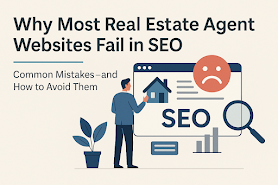Why Most Real Estate Agent Websites Fail in SEO
Real estate is hyper-competitive, and online, it’s a bloodbath.
You’ve got a website. Maybe you post blogs. Maybe you even throw money at Google Ads. But somehow, your listings are buried. Your site’s not getting traffic. And the agents down the street — the ones with the bland IDX feed and no blog — are ranking higher.
What gives?
Here’s the hard truth: most real estate agents are doing SEO completely wrong. And in 2025, that mistake is costing them leads, clients, and market share.
Let’s fix that.
🔍 The Harsh Truth: Real Estate SEO Is Broken
Most real estate websites are bloated, outdated, and built on false assumptions:
-
They depend on generic IDX feeds (which Google hates because they’re duplicate content).
-
They stuff pages with keyword soup like “homes for sale in [city]” without clear intent.
-
They treat SEO like a one-time setup — not a system.
That kind of SEO doesn’t just fail — it actually hurts your rankings.
🧠 What Google Actually Wants in 2025
Google has evolved. It doesn’t want content. It wants trusted, local experts who provide real value to searchers. Here’s what that means:
✅ 1. EEAT for Agents
Experience, Expertise, Authority, and Trustworthiness — and yes, Google measures it.
-
Real agent bios with background and experience
-
Links to your Google reviews
-
Media mentions, testimonials, and professional profiles like LinkedIn
✅ 2. Local Relevance
Google favors local signals:
-
Your Google Business Profile must be optimized and active
-
Consistent Name, Address, Phone info across the web (NAP)
-
Backlinks from local news, blogs, directories
✅ 3. Topical Authority
You don’t need more blog posts — you need better ones that work together.
-
Create content clusters around your niche (e.g. first-time buyers, luxury homes)
-
Cover neighborhoods deeply, not just “homes for sale” pages
-
Link between related posts and pages to build authority
🛠 3 SEO Moves Real Estate Companies Must Make Now
1. Local Landing Pages That Convert
Most “homes for sale in [city]” pages are dead weight.
You need landing pages that:
-
Answer real buyer/seller questions
-
Include photos, testimonials, and local stats
-
Encourage conversions (calls, form fills, etc.)
2. Neighborhood Content Hubs
Want to be the #1 expert in your area?
Build a content hub with:
-
Market trends
-
School district info
-
Commute times
-
Local businesses and lifestyle tips
That’s how you build search authority — and trust.
3. Agent Bio Pages That Rank
Google wants to rank people, not brands.
Every agent on your site should have:
-
A detailed, optimized bio
-
A profile photo
-
Links to reviews, social profiles, and active listings
-
Embedded schema markup
This also boosts entity SEO — and sets your site apart
🎯 Turn SEO Into Closings
Here’s the bottom line:
Real estate SEO in 2025 isn’t about tricks. It’s about showing Google (and buyers) that you’re the best local expert for the job.
If your site isn’t ranking, if your content isn’t working, if your leads aren’t coming in — I can help.
👉 Message me on LinkedIn — I’m always open to chat strategy.
👉 Or book a free audit and let’s find your next opportunity.
📋 Free Checklist: Real Estate SEO Essentials for 2025
| Item | Why It Matters |
|---|---|
| Custom listing descriptions | Avoids duplicate content penalties |
| Google Business Profile | Required for local pack visibility |
| Local backlinks | Builds authority and trust |
| Mobile speed | Affects bounce rate and rankings |
| Structured data/schema | Helps Google understand your content |
👤 About the Author
Asad Ulla Choudhury is a real estate SEO consultant who helps agents, brokerages, and real estate brands grow their organic traffic and convert more leads.
Want real tips, smart strategy, or just to connect with someone who gets the game?
➡️ Let’s connect on LinkedIn

Comments
Post a Comment